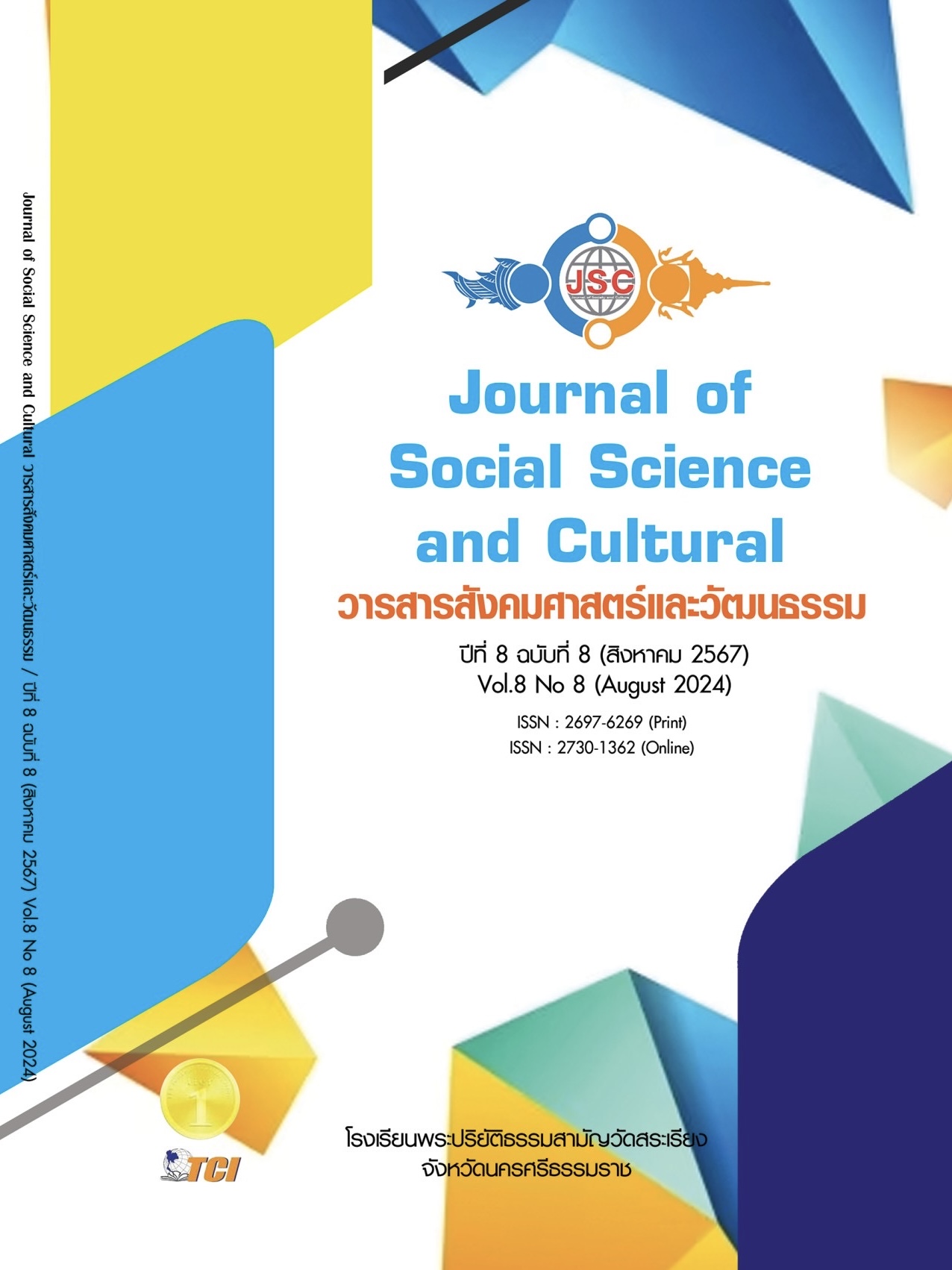SITUATION ANALYSIS: STATE OF MENTAL HEALTH OF PEOPLE IN MAHA SARAKHAM PROVINCE WHICH IS THE IMPACT OF THE OUTBREAK OF CORONAVIRUS 2019
Main Article Content
Abstract
This study is a descriptive research for analyzing the mental health situation using secondary data (resilience quotient, boredom, stress, depression, suicidal), namely Phase 1 that was conducted during the Coronavirus Disease 2019 outbreak B.E. 2563, Phase2 that was conducted during the severe outbreak of the Coronavirus Disease 2019 outbreak B.E. 2564, and Phase3 that conducted after the Coronavirus Disease 2019 outbreak B.E. 2565. The results were based on data derived from a sample randomly selected from the table of Krejcie & Morganand the table of random number revealed that the Phase1, the data were tested by means of Chi-Square test from 536 sample size, it was found that age, family characteristics, economy, and illness were significantly related to mental health conditions at the 0.05 level; the Phase2, the data were tested by means of Spearman Rank Correlation from 400 sample size, it was found that increasing age resulted in decreased resilience quotient, increased work boredom, decreased stress, decreased depression, and decreased suicidal tendency at the statistical significant level of 0.05; the Phase3, the data were tested by means of odds ratio from 460 sample size, it was found that 1) People with low income, people in debt, people with chronic disease, and bedridden patients tended to commit suicide 56.25 times, be stressed 49.88 times, be depressed 44.800 times compared to general people, and 2) People with low income, people in debt tended to have a risk of resilience quotient 22.05 times, a risk of stress 18.85 times, a risk of depression 16.46 times, and a risk of suicide 11.14 times compared to general people. In summary, risk factors include income, chronic disease, and bedridden illness. All those are continuously correlated with the occurrence of mental health conditions. Thus, it is necessary to formulate policies and strategies to address comprehensive mental health problems.
Article Details
References
กรมสุขภาพจิต. (2567). การสำรวจสถานการณ์สุขภาพจิตคนไทยผ่าน Mental Health Check In. ใน การประชุมเชิงปฏิบัติการแลกเปลี่ยนเรียนรู้การดำเนินโครงการประเมินสุขภาพจิตคนไทย. ระหว่างวันที่ 6 - 7 มิถุนายน 2567 ณ โรงแรมไมด้า งามวงศ์วานจังหวัดนนทบุรี (หน้า 1-15). นนทบุรี: กรมสุขภาพจิตกระทรวงสาธารณสุข.
กรมสุขภาพจิตกระทรวงสาธารณสุข. (2564). โปรแกรม Mental Health Check in & E-mail Alert. เรียกใช้เมื่อ 2 เมษายน 2566 จาก https://checkin.dmh.go.th/
ฉัตรศิริ ปิยะพิมลสิทธิ์. (2559). การใช้ IBM SPSS Statistics เพื่อการวิเคราะห์ข้อมูล. เรียกใช้เมื่อ 2 เมษายน 2566 จาก https://sornorpoom.files.wordpress.com/2017/06/e0b8a3e0b8a7e0b8a1spss.pdf
ปัตพงศ์ เกษสมบูรณ์. (2562). การวิเคราะห์ข้อมูลเชิงปริมาณ. เรียกใช้เมื่อ 2 เมษายน 2566 จาก https://fammed.kku.ac.th/file_download/file_65.pdf
ศูนย์สุขภาพจิตที่ 7. (2564). ก้าวทีละก้าว...กว่าจะมาเป็น Mental Health Check In จังหวัดมหาสารคาม. ใน การประชุมวิชาการสุขภาพจิตนานาชาติสุขภาพจิตดีวิถีชีวิตใหม่ New Normal Mental Health ครั้งที่ 20: Step by Step to…Becoming Mental Health Check In. ระหว่างวันที่ 7 - 9 กรกฎาคม 2564 ณ ห้องประชุมอาคาร 9 ชั้นโรงพยาบาลศรีธัญญา จังหวัดนนทบุรี (หน้า1 - 25). นนทบุรี: กรมสุขภาพจิตกระทรวงสาธารณสุข.
สำนักงานจังหวัดมหาสารคาม. (2563). เกณฑ์ชี้วัดผลสำเร็จของการดำเนินงานการคัดกรองสุขภาพจิต ด้วย Mental Health Check up ปีงบประมาณ พ.ศ. 2563. ใน การประชุมติดตามผลการดำเนินงานตามมาตรการเฝ้าระวัง ป้องกัน และควบคุมโรคติดเชื้อไวรัสโคโรนา 2019 จังหวัดมหาสารคาม (EOC):สถานการณ์การระบาดของเชื้อไวรัสโคโรนา 2019 ระหว่าง 23 มกราคม - 16 กรกฎาคม 2563. ณ ห้องประชุมพระธาตุนาดูน ศาลากลางจังหวัดมหาสารคาม (หน้า 9-10). มหาสารคาม: ไม่ปรากฎสำนักพิมพ์.
สำนักงานสาธารณสุขจังหวัดมหาสารคาม. (2564). คู่มือการประเมินผลการปฏิบัติราชการ (KPIs) ระดับอำเภอประจำปีงบประมาณ 2564 สำนักงานสาธารณสุขจังหวัดมหาสารคาม. เรียกใช้เมื่อ 2 เมษายน 2566 จาก http://mkho-web.moph.go.th/web2023/frontend/web/index.php/showdetail?id=135
สำนักงานสาธารณสุขจังหวัดมหาสารคาม. (2565). คู่มือการประเมินผลการปฏิบัติราชการ (KPIs) ระดับอำเภอ. เรียกใช้เมื่อ 2 เมษายน 2566 จาก http://mkho-web.moph.go.th/web2023/frontend/web/index.php/showdetail?id=132
Bliźniewska-Kowalska, K. M. et al. (2021). A Review of the Global Impact of the COVID-19 Pandemic on Public Mental Health, with a Comparison Between the USA, Australia, and Poland with Taiwan and Thailand. Medical Science Monitor Journal, 21(27), 1-8.
Gloster, A. T. et al. (2020). Impact of COVID-19 pandemic on mental health: An international study. PLOS ONE, 15(12). 1-20.
Gonzalez-Gerez, J. J. et al. (2020). Therapeutic pulmonary tele-rehabilitation protocol for patients affected by COVID-19, confined to their homes: study protocol for a randomized controlled trial. Trials, 21(1). 1-9.
Levis, B. et al. (2020). Accuracy the PHQ-2 alone and in combination with the PHQ-9 for screening to detect Major depression: systematic review and meta-analysis. Jama, 323(22), 2290-2300.
Teeravisutkul, P. et al. (2019). Stress and craving reduction under treatment with heart ratevariability biofeedback and the Phramongkutklao model among patients with alcohol use disorder. Psychology Research and Behavior Management, 19(12), 619-627.


